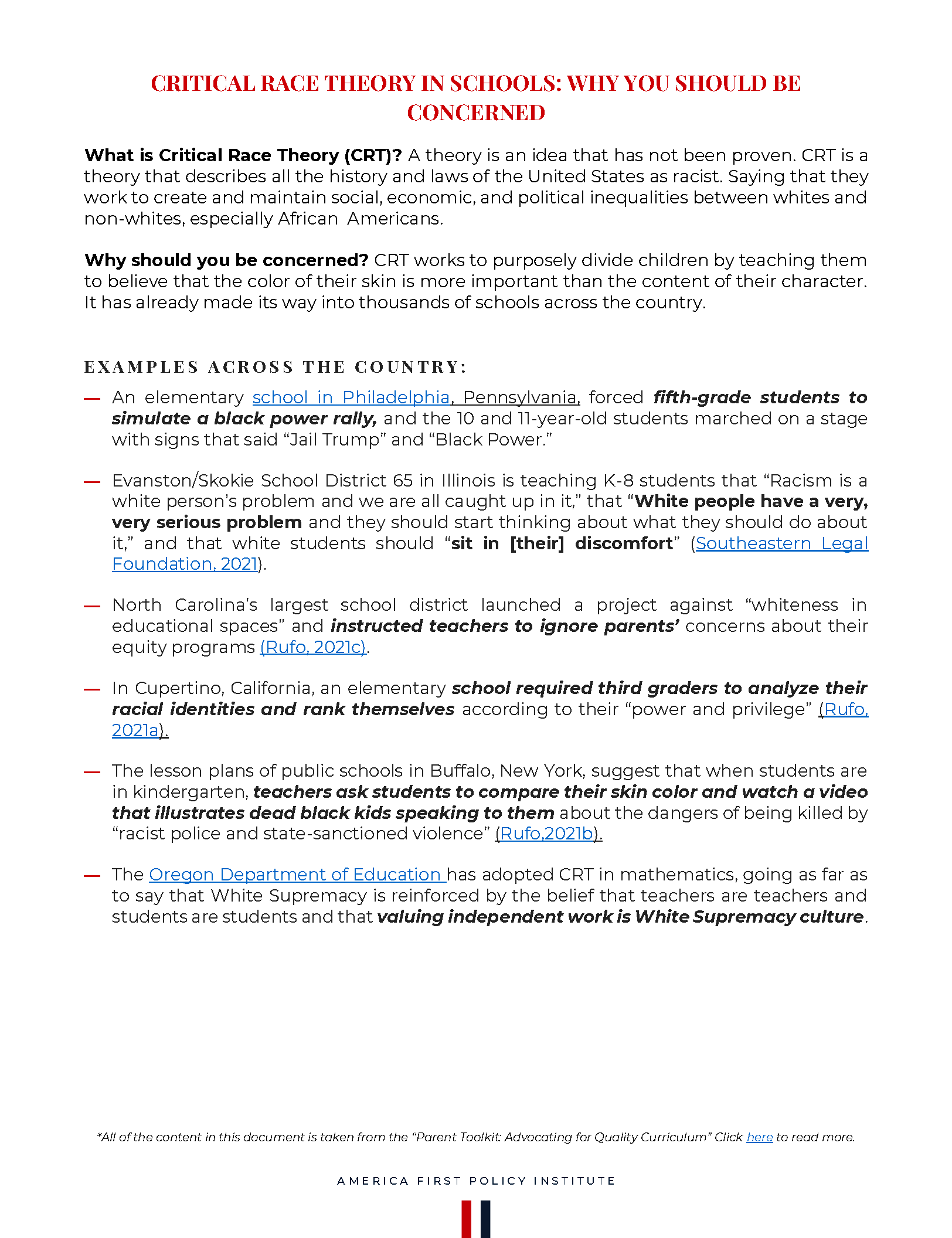Parent Toolkit - Critical Race Theory in Schools: Why You Should Be Concerned
What is Critical Race Theory (CRT)? A theory is an idea that has not been proven. CRT is a theory that describes all the history and laws of the United States as racist. Saying that they work to create and maintain social, economic, and political inequalities between whites and non-whites, especially African Americans.
Why should you be concerned? CRT works to purposely divide children by teaching them to believe that the color of their skin is more important than the content of their character. It has already made its way into thousands of schools across the country.
EXAMPLES ACROSS THE COUNTRY:
- An elementary school in Philadelphia, Pennsylvania, forced fifth-grade students to simulate a black power rally, and the 10 and 11-year-old students marched on a stage with signs that said “Jail Trump” and “Black Power.”
- Evanston/Skokie School District 65 in Illinois is teaching K-8 students that “Racism is a white person’s problem and we are all caught up in it,” that “White people have a very, very serious problem and they should start thinking about what they should do about it,” and that white students should “sit in [their] discomfort” (Southeastern Legal Foundation, 2021).
- North Carolina’s largest school district launched a project against “whiteness in educational spaces” and instructed teachers to ignore parents’ concerns about their equity programs (Rufo, 2021c).
- In Cupertino, California, an elementary school required third graders to analyze their racial identities and rank themselves according to their “power and privilege” (Rufo, 2021a).
- The lesson plans of public schools in Buffalo, New York, suggest that when students are in kindergarten, teachers ask students to compare their skin color and watch a video that illustrates dead black kids speaking to them about the dangers of being killed by “racist police and state-sanctioned violence” (Rufo,2021b).
- The Oregon Department of Education has adopted CRT in mathematics, going as far as to say that White Supremacy is reinforced by the belief that teachers are teachers and students are students and that valuing independent work is White Supremacy culture.
ACTIONS PARENTS CAN TAKE TO PROTECT PATRIOTIC VALUES IN THEIR SCHOOLS
- Join and Attend your Local PTA (Parent Teacher Association) or PTO (Parent Teacher Organization). Attending meetings offers a great opportunity to interact with other parents, talk with teachers, and ask questions about what is being taught in the classrooms. Ask your school principal or email your child’s teacher to get involved.
- Request Access to Educational Materials. As a parent, you have the right to ask for information regarding educational materials being taught. You also have the right to observe your child during the school day. There is a law that states “parents have reasonable access to staff, opportunities to volunteer and participate in their child’s class and observation of classroom activities.”
- Get Involved with Your Local School Board and Attend Meetings. These meetings are where important issues that affect your child’s education are discussed. Parents can search when and where the school board meetings take place. Information on school board meetings is on the school district website. You can make public comments at the beginning or end of the meeting to ensure members know your concerns.
- Inquire What Issues Your Local School Board Is Taking Up. Reach out to your local school board members and ask them directly what issues the school board is taking up. You can find school board agendas on the district’s website. Ideally, you could call ahead or look on the website to find out what topics will be covered at the upcoming meeting. This is important because these topics are what you are allowed to talk about. If you want to bring up another subject, it is usually only allowed when general public comments can be made at the end of the meeting.
- Meet with individual school board members. School board member information is typically posted on the website (if you cannot find their email or phone number, you can call the district phone number).
- Run For a School Board Office or Encourage Community Members with Similar Values to Run. You do not need a background in public education or public policy to run for a school board position. School board members have the power to make significant changes to schools. To find information about your next local school board election, you can visit the district’s website. If you cannot find this information on the website, you can call the district or the superintendent’s office. Don’t forget to vote!
More Resources
July 06, 2023
AFPI Leads the Charge in Most Historic Year for School Choice Progress
At the America First Policy Institute (AFPI), we believe that the transformative progress on school choice will help prepare Americans for the rights and responsibilities of citizenship.
April 04, 2023
FACT SHEET: Colorado HB23-1003 Gives Parents Less Control Over Their Child’s Education
“I do not believe in co-parenting with the government, and I never will. Parental rights are a God-given blessing. I am deeply saddened to see our country even debating who should…
March 24, 2023
